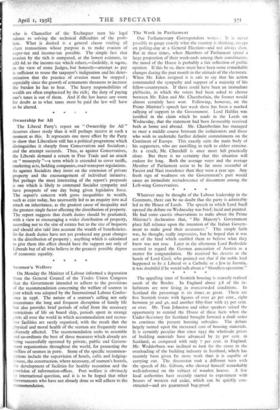The Week in Parliament Our Parliamentary Correspondent writes : It
is never possible to gauge exactly what the country is thinking, except on polling-day at a General Election—and not always then. But in these times, when Members of Parliament spend a large proportion of their week-ends among their constituents, the mood of the House is probably a fair reflection of public opinion. If this be so, there must have been some remarkable changes during the past month in the attitude of the electorate. When Mr. Eden resigned it is safe to say that his action commanded the sympathy and support of a majority of his fellow-countrymen. If there could have been an immediate plebiscite, in which the voters had been asked to choose between Mr. Eden and Mr. Chamberlain, the former would almost certainly have won. Following, however, on the Prime Minister's speech last week there has been a marked rallying of support to the Government. Lord Halifax was justified in the claim which he made in the Lords on Wednesday, that the statement had been favourably received both at home and abroad. Mr. Chamberlain has managed to steer a middle course between the isolationists and those who wish to undertake further definite commitments on the Continent of Europe. This exactly suits the main body of his supporters, who are unwilling to rush to either extreme. As a result, Mr. Churchill is once more left practically alone. But there is no certainty that this situation will endure for long. Both the average voter and the average Member of Parliament seem to be far more resentful of Fascist and Nazi truculence than they were a year ago. Any fresh sign of weakness on the Government's part would cause an immediate recrudescence of discontent among the Left-wing Conservatives. * * * *














































 Previous page
Previous page